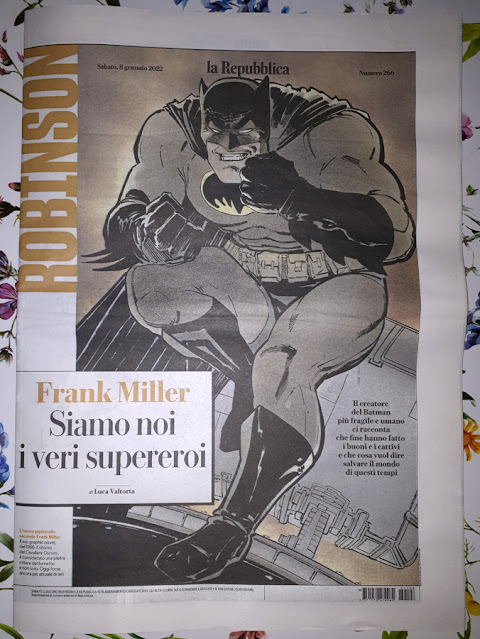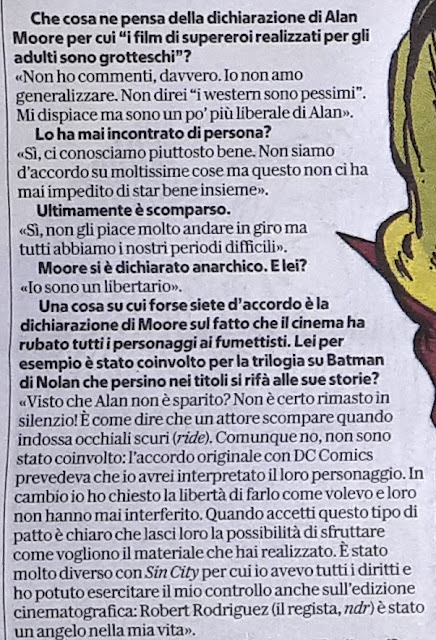[...] What Eddie and Alan do have in common is an eagerness to expand the concerns of the 'comic' strip, whether in the big-bucks industry or through the small press scene. They spent the lunchtime drinking and talking. The subject of food didn't come up until last orders, when they adjourned for, as Alan put it, 'Pancakes with the Popular!'
[...]
Eddie Campbell: On Swamp Thing and others, you're working on raw material that's supplied to you. My stories are found, not constructed. You construct your stories almost along the lines of a song, in verse, rhythmic repetitions, all song devices.
Alan Moore: Yes, I work on a page length.
E: The page as your basic unit, the stanza. I'm finding a more organic shape, like a twisted branch, which is a form. You wrote in a review that 'Eddie doesn't write stories as such.' What do you think of as a story?
A: I've got a broad definition of the term story. What I meant was that to an audience weaned on average comics, you would not be writing stories. Now I can see it as a story, but to them the average comic is a continuum made up of lots of little episodes all strung together. You've got your own continuum, but you look at it differently, one single hour, one single day, out of the middle of it and you study it and suddenly you can see all the patterns that emerge in it. What both of us have in common is that we approach comics not just with a visual but with a literary sensibility. I can see that in your stuff and I know you do it consciously. What's come to constitute a story in comics is one where it's formularised, you set up the characters on the first page, the conflict round about the third page and when the conflict has resolved, the story's over.
E: I feel it's wrong to try to define the comic strip in formal terms. Comics are very much a tradition.
A: Oh yes, once comics encompassed a vast range of things, but we've deliberately limited our own field, hamstrung it. The superhero is an aberration, he's a jerk. He should never have been allowed to dominate the field. It's starting to change, but when you think of the tyranny of the superhero, you realise there are a lot of comic forms that are rarely explored anymore today.
E: Remember Rube Goldberg's delightful inventions? Isn't this idea of comics being 'sequential narrative' very limiting if we've got to exclude things like that?
A: But that happens with anything once you've got it rigidly defined. Years ago nobody knew what comics were, so they just did what they wanted. Imagine if George Herriman had ever read How To Draw Comics The Marvel Way, he'd be told he got his backgrounds wrong in 'Krazy Kat' because they weren't consistent! Once you create a rule, it's there to be ignored.
[...]
E: The terrible thing is that when you're looking for stories, life becomes fiction, stories happen because you were looking for them.
A: Well I'll tell you what I saw today. It's partly because I've started giving up smoking, so I've got that low nicotine jangliness which makes you perceive the world as a very strange place. I was standing at Lewisham station, looking down from the hill at this grim industrial cluster of prefabricated buildings with all these caravans parked on this grey asphalt stretch of land. Playing around the caravans were about ten young children, all of them looked cold and scruffy, and about fifteen dogs. This really strange little land of children and dogs, no adults to be seen anywhere. That struck me. I could probably come up with a story about it, but I can't work it into Swamp Thing.
E: It seems terrible to me that we're always stuck with melodrama. Why have comics always been melodramatic? There are stories in abundance, everywhere I looked I see something I want to record.
A: We mentioned the literary side of comics and it's a good comparison, because with literature the range of stories open to you is infinite. Whereas, if you want to make a living in the comics industry, you've got to write something on the level of 'Bulldog Drummond'.
E: I don't agree, we've got to expand it.
A: Oh yes. We're probably approaching the same problem from different ends. In my better stuff I'm trying to expand the concerns of what can or can't be done in mainstream comics. Nothing radical, but 'V for Vendetta', 'Bojeffries' and the odd page in Swamp Thing tread on new territory, even if it is still within the same basic structure. You're coming at it from totally outside the established comics field, just going out there to stake some territory. Hopefully we can meet . . .
E: Out on the perimeter, you mean! Another difference between us is that you're employed to do something, whereas I find myself urged to do something.
A: Yes, that's right. And I'm getting really bored with it.
E: I'm sure you could work my way.
A: Yes, I could. I'm really envious of your stuff - I have been for a while.
E: I'm envious of the money you're making!
A: I don't think I'm that envious of your stuff that I'd swap it for the money I'm making! I'm making what I call silly money, just from Swamp Thing alone. I've bought my Dad a greenhouse and my Mum an electric organ - I'm a big softy! There's too much money in American comics at the moment, it encourages greediness. It's a big temptation but I don't, because I'm a man of iron too! Ater I read 'Alec', I felt cheerier than when I started, uplifted to a minor degree. When I read my stuff, I come to the conclusion that I intended to do emotional or intellectual violence to the reader! It's very grim and nasty.
E: It's hard-bitten.
A: That's it. I just wish I could loosen my sphincter a bit! I wish I could do something that would make people feel good! I'm actually a very optimistic person, but obviously there's a lot of real black shit that needs to be worked out!
E: I think the reader gets the impression that I might be a nicer man to meet!
A: I think that's probably true!
[...]
E: [...] Do you think of comics as condensed films?
A: No, I try to question the instant assumption that films are comics' closest relative. To me it's a literary thing; not purely, there's the visual side as well.
E: I see the root of comics as the cartoon. I try to have each frame as an autonomous cartoon.
A: I can see that. In every shot you've got the entire bar and you can see all the characters. You don't give Danny Grey a close-up when he's saying something clever. That's a lot closer to the newspaper style of cartooning. You've made a true point but you've made a language that is eminently suitable for your sort of strips. You have to change the basic language of comics before you can change the content.
E: Yeah. I find in the wake of Escape, there's a lot of people trying to do the found story, overheard conversations, observations of life. So they're aware of a trend towards more sensitive comics, but many of them are still using the language of melodrama.
A: What I'm interested in is the creative process itself. I never get asked about that. But it's the most difficult thing to talk about, because the only language you can use is comics or music or whatever art you are doing, it's difficult to talk about all the tiny invisible decisions going on in your subconscious.
[...]
A: Theoretically if someone could use comics right, you could have a form of art that was more affecting than films or novels, if you could get that juxtaposition of word and image, so that you're striking all the chords. This is one thing I like about your stuff and which I try to emulate to a degree. If you give the reader a complete parcel of a neat plot, neat elliptical dialogue that all ties up neatly into a neatly resolved story, there's nothing left for the reader to digest, it's just something to swallow and shit. It'll taste nice on the way down but has no nutritional value whatever. The story should occur not on the page but five minutes later in the reader's mind. The best books I've read often have some line or scene that will be gnawing at the back of my mind for months. What did he mean? What was he trying to say? Thomas Pynchon's 'Gravity's Rainbow' has so much of that, every page has got one of those on it.
E: There's a sense of meaning rather than a statement.
A: Yeah, meaning is redundant, a meaning is a statement which is not a very interesting thing to make because it's dead, it's flat, it doesn't do anything. I mean 'War is Hell', it doesn't grow, whereas 'War is Fast Food', then people think 'What does he mean?' and they might actually take a week trying to figure it out. As it happens readers, it doesn't mean anything! But if there is that obliqueness to things, then it involves the audience, drags them in.
[...]
E: How do you feel about being considered a celebrity?
A: I know it's a bit wingey and whiny but sometimes I wish I didn't get quite the scrutiny that I do. When I started out writing, nobody expected me to be any good, so any good stories I did were seen as being really miraculous. But now if I do a story that's average or dull, then I'm sure most people see it as the beginning of the end. In that respect the relationship between the reader and the artist gets a bit twisted. It's no longer straight communication. It's probably something you've got to put up with.
E: But would you have been happier to remain in anonymity as Curt Vile?
A: Probably not and that just exposes my basic dishonesty! I may bitch about all this, but there is something wrong with the medium at the moment. If there were more good strip creators around, there wouldn't be so much unhealthy importance attached to personalities like Frank Miller or on one level me and on another you. There wouldn't be that Messianic glee and fervour and people would be able to look at the work more honestly and judge it independently of the hype surrounding it.
E: I think that's unavoidable, that's human nature.
A: But it's not the same in literature.
E: But it's not so exciting is it?
A: No. It's the youth of the audience that makes what we're doing closer to pop music. Popular culture.
E: Then you have to accept that this is the way it's got to go.
A: Yes, we can be teen idols!








